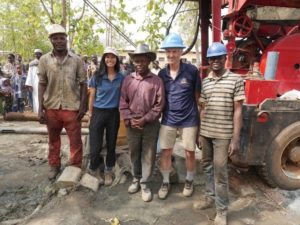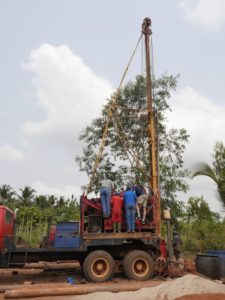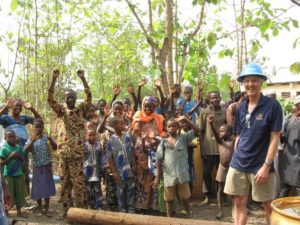Benin – Africa Calling
It started with a phone call from the Global Aid Network (GAiN) in Vancouver. Stephanie McDonald (who spoke at the BCGWA conference in 2016) asked if I would be interested in going to Benin to work with several teams drilling water wells in rural communities using cable tool drills. My brother Paul had done the same thing one year earlier in Tanzania. The proposal was for two weeks of volunteer time helping the locals with issues around equipment, maintenance, and technique. I am always up for an adventure so of course I said yes, and while we were talking I googled “Benin” to find out where the heck it was.
It turns out Benin is a small “thumb print” of a country facing due South on the West side of Africa, eight degrees North of the Equator and bounded by Togo to the West, Nigeria to the East, and Niger to the North.
 GAiN is a Christian organization that has several programs in different countries in Africa and elsewhere. They engage in providing education and in this case, water wells for communities that have no reliable access to clean safe water. In the interest of full disclosure I felt it important to tell them that I was a devout, practicing atheist. But that I was happy to help provide water to Baptists, Muslims, Martians or any other peoples that desperately needed clean safe water for themselves and their families.
GAiN is a Christian organization that has several programs in different countries in Africa and elsewhere. They engage in providing education and in this case, water wells for communities that have no reliable access to clean safe water. In the interest of full disclosure I felt it important to tell them that I was a devout, practicing atheist. But that I was happy to help provide water to Baptists, Muslims, Martians or any other peoples that desperately needed clean safe water for themselves and their families.
My wife Kelly and I started off our adventure in mid-January with a 5 day camping safari in Serengeti Park in Tanzania. We were sleeping with just a canvas tent wall between us tender tourists and the lions, hyenas and jackals at night. Luckily, they were all well fed on the abundant zebras and wildebeest and apparently they usually do not like their food wrapped in canvas. After the amazing safari where we saw every animal you could hope for, many at very close range, we went on to Zambia and spent a week with my brother who is living there with his wife and 2 young children. I flew to Benin in early February for my 2 week stint, while Kelly returned home to enjoy this years’ extended winter on Vancouver Island.
When I arrived in Benin, I was amazed at the amount of work that these people had been able to accomplish with these old cable tool drills having very little training and very little access to parts and technical support. They have drilled over 1,000 wells in a 13 year period. This includes not only drilling the wells, but pouring cement pads, installing hand pumps, and training local villagers to perform the repairs and maintenance on the pumping equipment. I was also amazed at how hot it was, and how much an old honkey from Canada sweats at 38 degrees and 100% humidity.
I was not the first British Columbian to visit them to provide training and assistance. Cyril Walsh from the lower mainland went when the first rig arrived 13 years ago, and spent 1 week training the staff. The next visit by a driller was 8 years later by Paul Anderson of Canwest Drilling out of Powell River. He found that they were severely lacking in understanding about proper lubricating of the cable tool equipment and completely ignorant regarding the design and purpose of various types of drilling tools that they had been carrying around for years, but had never known how or when to use them.
While Paul Anderson was there, he really opened their eyes as to how a cable tool rig and it’s tooling can be optimized to produce the best outcomes in the shortest timeframe. So when I got there, they were doing an excellent job of greasing the rigs, setting them up and operating them safely and efficiently. Unfortunately, they were still uncertain about how and when to use a suction bailer versus a dart bailer, how to ensure that the drill line is feeding properly, and how to adjust the jackshaft clutches correctly. Consequently, clutch parts and jackshafts were broken and welded up (but still working) and some of the tools that Paul Anderson had built and shown them how to use, were either worn out, or still laying idle on the side of the rigs.
I felt my 2 weeks was well spent and I really enjoyed my time working with 4 different teams of African well drillers in rural village settings. Most of these people are dirt poor and in fact most villagers live in houses made of mud and sticks with dirt floors and few doors or window to plug the holes in the walls. Roofs are often thatch or palm fronds, with the more affluent using old rusty 2nd hand tin roofing. Electricity and running water are non-existent in the rural villages and the kids are mostly bare foot. School is free, but many cannot afford the mandatory uniforms, so even free schooling is unaffordable for some.
 The Drill Crews are well paid by local comparison, but earn less than $5 per hour and work 10 hour days and 6 day weeks. When they are working away from their homes (which is almost always) the villagers must provide them with food and accommodation. This means that they will often be sleeping on the floor of a mud hut, and eating whatever is the local in-season diet. Typically ground corn paste and goat or chicken are the mainstays. I tried goat and local chicken while I was there and both were tasty, spicy, and generally fairly chewy. My accommodation was luxurious by comparison to that of the drill crews, but when compared with the most basic hotel/motel in Canada it would be considered very “rustic”.
The Drill Crews are well paid by local comparison, but earn less than $5 per hour and work 10 hour days and 6 day weeks. When they are working away from their homes (which is almost always) the villagers must provide them with food and accommodation. This means that they will often be sleeping on the floor of a mud hut, and eating whatever is the local in-season diet. Typically ground corn paste and goat or chicken are the mainstays. I tried goat and local chicken while I was there and both were tasty, spicy, and generally fairly chewy. My accommodation was luxurious by comparison to that of the drill crews, but when compared with the most basic hotel/motel in Canada it would be considered very “rustic”.
One of the highlights for me was at a site where I was with the same crew from start to completion of a 160 ft deep well in bedrock. There were from 10 to 40 people watching the whole time the rig was drilling, which was a total of 5 days. When the well was finished and we knew it was going to produce more than 10 gallons per minute, the villagers all burst into song with clapping, waving and dancing. It was certainly a far more enthusiastic response than we typically get for a 10 gpm well back home. I was very moved by the laughter, generosity, joy and gratitude that I saw amongst these people who have so little; compared to us who expect and take so much for granted. I am sure that there would be a lot less discontent and intolerance in our societies if all of us had the chance to see the reality of life for most of the planet’s inhabitants, who through no fault or action of their own were born into a world where opportunity for wealth or comfort is almost non-existent. Whereas for most of us, simply because of the luck of our birth (choosing our parents wisely), our opportunities are vast and abundant.
I hope that if the opportunity ever presents itself, you will go and at least visit a third world country. But better yet, if you can, spend some time volunteering at a school, clinic or orphanage, or sharing your knowledge and experience with people who will be extremely grateful for your generosity. The best part is getting to know these people and sharing in their lives, their stresses, their jokes and their laughter. I guarantee it will leave a permanent impression on you and it will likely change you forever in a positive way.
